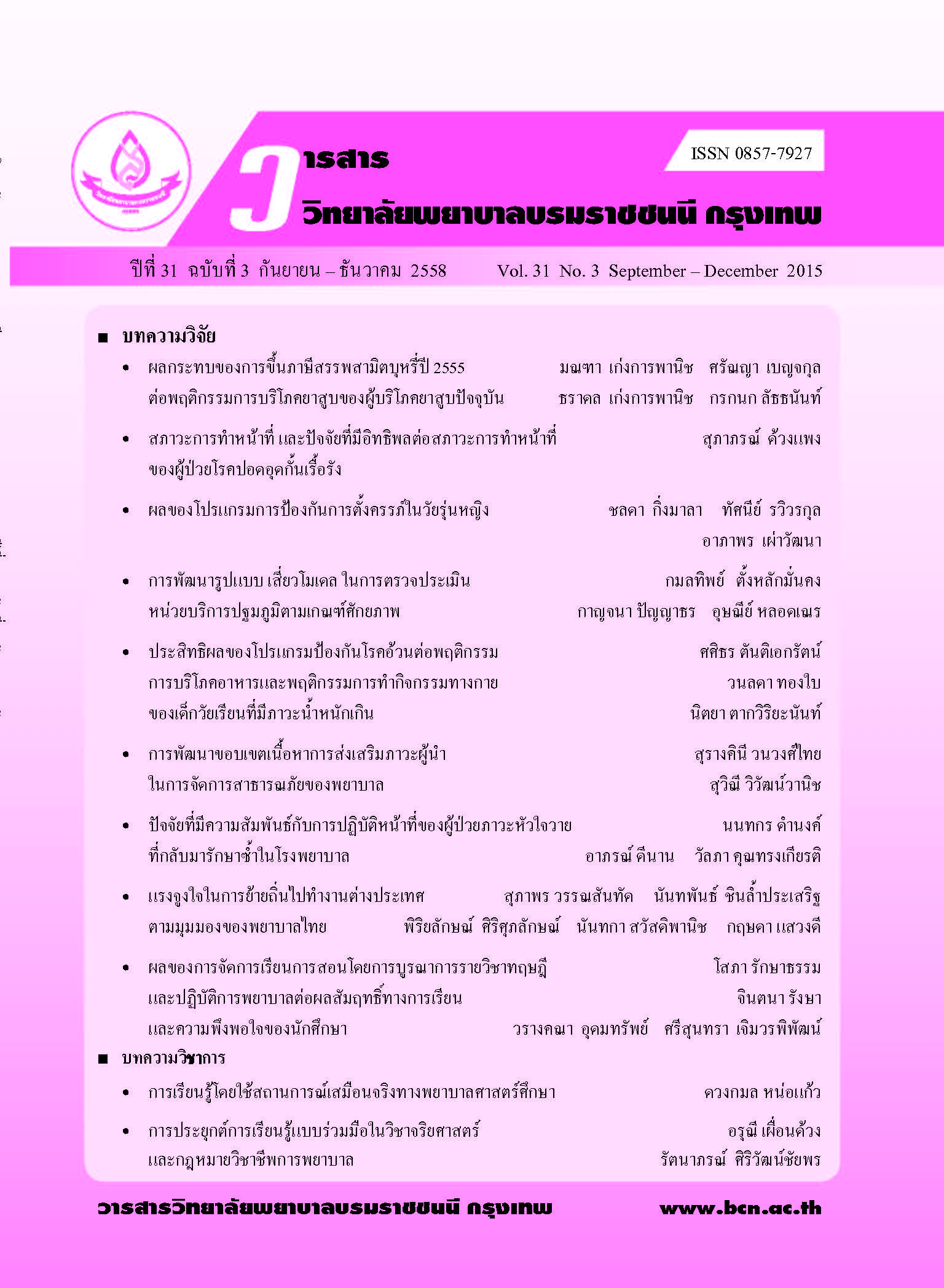ประสิทธิผลของโปรแกรมป้องกันโรคอ้วนต่อพฤติกรรมการบริโภคอาหารและ พฤติกรรม การทำกิจกรรมทางกายของเด็กวัยเรียนที่มีภาวะน้ำหนักเกิน THE EFFECTIVENESS OF OBESITY PREVENTION PROGRAM ON EATING AND PHYSICAL ACTIVITY BEHAVIORS AMONG OVERWEIGHT SCHOOL–AGED CHILDRE
คำสำคัญ:
โปรแกรมป้องกันโรคอ้วน, พฤติกรรมการบริโภคอาหาร, พฤติกรรมการทำกิจกรรมทางกาย, เด็กวัยเรียน, การสนับสนุนทางสังคม, obesity prevention program, eating behavior, physical activity, school-aged children, social supportบทคัดย่อ
บทคัดย่อ
การศึกษาครั้งนี้ เป็นการวิจัยกึ่งทดลองแบบสองกลุ่ม วัดผลก่อนและหลังการทดลอง มีวัตถุประสงค์เพื่อศึกษา ผลของโปรแกรมป้องกันโรคอ้วนต่อพฤติกรรมการบริโภคอาหาร และพฤติกรรมการทำกิจกรรมทางกายของเด็กวัยเรียนที่มีภาวะน้ำหนักเกิน กลุ่มตัวอย่างเป็นเด็กวัยเรียนที่มีภาวะน้ำหนักเกิน อายุ 10-12 ปี ที่กำลังศึกษาในโรงเรียนสังกัดรัฐบาล อำเภอเมือง จังหวัดตรัง จำนวน 120 คน คัดเลือกกลุ่มตัวอย่างแบบเฉพาะเจาะจงตามเกณฑ์ที่กำหนด และทำการสุ่มตัวอย่างอย่างง่ายเข้ากลุ่มทดลอง และกลุ่มควบคุม กลุ่มละ 60 คน กลุ่มทดลองได้รับโปรแกรมป้องกันโรคอ้วนในเรื่องการบริโภคอาหารตามหลักสัญญาณไฟจราจร หลักการทำ กิจกรรมทางกายตามข้อแนะนำขององค์การอนามัยโลก และการสนับสนุนทางสังคมจากครู เป็นระยะเวลา 12 สัปดาห์ ส่วนกลุ่มควบคุมได้รับการดูแลตามปกติของโรงเรียน เครื่องมือที่ใช้เป็นแบบสอบถามพฤติกรรมการบริโภคอาหาร และพฤติกรรมการทำกิจกรรมทางกาย วิเคราะห์ข้อมูลทั่วไปด้วยสถิติเชิงพรรณนา และเปรียบเทียบคะแนนเฉลี่ยพฤติกรรมการบริโภคอาหารและการทำกิจกรรมทางกายระหว่างกลุ่มทดลองและกลุ่มควบคุม โดยใช้สถิติ independent t–test ผลการวิจัย พบว่า คะแนนเฉลี่ยพฤติกรรมการบริโภคอาหารและคะแนนเฉลี่ยพฤติกรรมการทำกิจกรรมทางกายของกลุ่มทดลอง สูงกว่า กลุ่มควบคุม อย่างมีนัยสำคัญทางสถิติ
ผลการศึกษาครั้งนี้ แสดงให้เห็นว่าโปรแกรมป้องกันโรคอ้วนสามารถทำให้เด็กวัยเรียนมีพฤติกรรมการบริโภคอาหาร และพฤติกรรมการทำกิจกรรมทางกายที่เหมาะสมเพิ่มขึ้นได้ พยาบาลส่งเสริมสุขภาพสามารถนำโปรแกรมป้องกันโรคอ้วนไปใช้ โดยดำเนินการประสานงานร่วมกับทางโรงเรียน และบุคลากรที่เกี่ยวข้องรวมทั้ง ครูสามารถนำโปรแกรมป้องกันโรคอ้วนไปประยุกต์ใช้สอนในชั้นเรียนได้
Abstract
The purpose of this quasi-experimental study, a two-group pre- test/ post- test design, was to examine the effectiveness of an obesity prevention program on eating and physical activity behaviors among overweight school-aged children. The sample was consisted of 120 children aged 10 - 12 years old studying in public schools in Umphur Muang, Trang province, Thailand. They were selected based on inclusion criteria and a randomized sampling technique was used for allocating them to the experimental and control groups (60 each). The obesity prevention program was implemented in the experimental group, including traffic light eating behaviors, WHO recommended physical activities, and social support from the teacher for 12 weeks. The control group received only usual care by the school. Eating and physical activity behavior questionnaires were used for collecting data at before and after the intervention. Data were analyzed using descriptive statistics and independent t - test.
The results indicated that the mean score for eating behaviors and physical activity behaviors of the experimental group was significantly higher than that of the control group (p<.001). This study suggests that this obesity prevention program is effective in terms of increasing proper eating behaviors and physical activity behaviors among overweight children. Health-promoting personnel can apply this program by working cooperatively with the school and the teachers can apply this program in classroom teaching.
Downloads
ดาวน์โหลด
เผยแพร่แล้ว
รูปแบบการอ้างอิง
ฉบับ
ประเภทบทความ
สัญญาอนุญาต
บทความที่ได้รับการตีพิมพ์ เป็นลิขสิทธิ์ของวารสารวิจัยสุขภาพและการพยาบาล (วิทยาลัยพยาบาลบรมราชชนนี กรุงเทพ) ไม่สามารถนำไปตีพิมพ์ซ้ำในวารสารฉบับอื่น


















